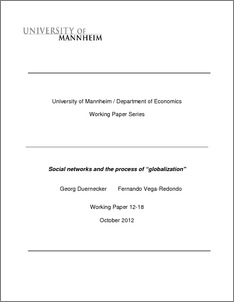|
Social networks and the process of "globalization"
Dürnecker, Georg
;
Vega-Redondo, Fernando
![[img]](https://madoc.bib.uni-mannheim.de/style/images/fileicons/application_pdf.png)  Vorschau |
|
PDF
Duernecker_&_Vega-Redondo12-18.pdf
- Veröffentlichte Version
Download (997kB)
|
|
URL:
|
https://ub-madoc.bib.uni-mannheim.de/32545
|
|
URN:
|
urn:nbn:de:bsz:180-madoc-325453
|
|
Dokumenttyp:
|
Arbeitspapier
|
|
Erscheinungsjahr:
|
2012
|
|
Titel einer Zeitschrift oder einer Reihe:
|
Working Paper Series
|
|
Band/Volume:
|
12-18
|
|
Ort der Veröffentlichung:
|
Mannheim
|
|
Sprache der Veröffentlichung:
|
Englisch
|
|
Einrichtung:
|
Fakultät für Rechtswissenschaft und Volkswirtschaftslehre > VWL, Angewandte Makroökonomik (Juniorprofessur) (Dürnecker 2010-2017)
|
|
MADOC-Schriftenreihe:
|
Department of Economics > Working Paper Series
|
|
Fachgebiet:
|
330 Wirtschaft
|
|
Fachklassifikation:
|
JEL:
D83 , D85 , C73 , O17 , O43,
|
|
Freie Schlagwörter (Englisch):
|
Social networks , Globalization , Search , Cooperation , Social Cohesion , Innovation
|
|
Abstract:
|
We propose a stylised dynamic model to understand the role of social networks in the phenomenon
we call "globalization." This term refers to the process by which even agents who are geographically far apart come to interact, thus being able to overcome what would otherwise be a fast saturation of local opportunities. A key feature of our model is that the social network is the main channel through which agents exploit new opportunities. Therefore, only if the social network becomes global (heuristically, it "reaches far in few steps") can global interaction be steadily sustained. To shed light on the conditions
under which such a transformation may, or may not, take place is the main objective of the paper.
One of the main insights arising from the model is that, in order for the social network to turn global, the economy needs to display a degree of "geographical cohesion" that is neither too high (for then global
opportunities simply do not arise) nor too low (then the meeting mechanism displays too little structure for the process to take off). But if globalization does materialize, we show that it is a robust state of affairs that often arises abruptly as key parameters change. This occurs, in particular, as the rate of arrival of ideas rises, or when there is a high enough increase in the range at which the network transmits
information.
|
 | Dieser Eintrag ist Teil der Universitätsbibliographie. |
 | Das Dokument wird vom Publikationsserver der Universitätsbibliothek Mannheim bereitgestellt. |
 Suche Autoren in Suche Autoren in
Sie haben einen Fehler gefunden? Teilen Sie uns Ihren Korrekturwunsch bitte hier mit: E-Mail
Actions (login required)
 |
Eintrag anzeigen |
|
|



 Suche Autoren in
Suche Autoren in